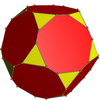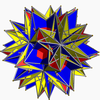Small retrosnub icosicosidodecahedron
| Small retrosnub icosicosidodecahedron | |
|---|---|

| |
| Type | Uniform star polyhedron |
| Elements | F = 112, E = 180 V = 60 (χ = −8) |
| Faces by sides | (40+60){3}+12{5/2} |
| Wythoff symbol | | 3/2 3/2 5/2 |
| Symmetry group | Ih, [5,3], *532 |
| Index references | U72, C91, W118 |
| Dual polyhedron | Small hexagrammic hexecontahedron |
| Vertex figure |  (35.5/3)/2 |
| Sirsid | |

3D model of a small retrosnub icosicosidodecahedron
In geometry, the small retrosnub icosicosidodecahedron (also known as a retrosnub disicosidodecahedron, small inverted retrosnub icosicosidodecahedron, or retroholosnub icosahedron) is a nonconvex uniform polyhedron, indexed as U72. It has 112 faces (100 triangles and 12 pentagrams), 180 edges, and 60 vertices.[1] It is given a Schläfli symbol ß{3⁄2,5}.
The 40 non-snub triangular faces form 20 coplanar pairs, forming star hexagons that are not quite regular. Unlike most snub polyhedra, it has reflection symmetries.
Convex hull[]
Its convex hull is a nonuniform truncated dodecahedron.
 Truncated dodecahedron |
 Convex hull |
 Small retrosnub icosicosidodecahedron |
Cartesian coordinates[]
Cartesian coordinates for the vertices of a small retrosnub icosicosidodecahedron are all the even permutations of
- (±(1-ϕ−α), 0, ±(3−ϕα))
- (±(ϕ-1−α), ±2, ±(2ϕ-1−ϕα))
- (±(ϕ+1−α), ±2(ϕ-1), ±(1−ϕα))
where ϕ = (1+√5)/2 is the golden ratio and α = √3ϕ−2.
See also[]
References[]
- ^ Maeder, Roman. "72: small retrosnub icosicosidodecahedron". MathConsult.
{{cite web}}: CS1 maint: url-status (link)
External links[]
- Weisstein, Eric W. "Small retrosnub icosicosidodecahedron". MathWorld.
- Klitzing, Richard. "3D star small retrosnub icosicosidodecahedron".
Categories:
- Uniform polyhedra
- Polyhedron stubs